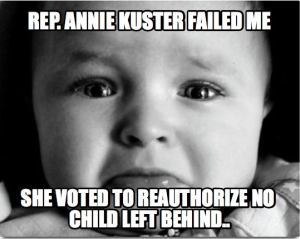We have been fighting against the reauthorization of No Child Left Behind for several months now. It began with the U.S. House drafting H.R.5 and the U.S. Senate drafting “Every Child Achieves Act”. After each bill passed the House and Senate, they were then sent to a Conference Committee to come up with a final Bill. That final Bill was released with over 1,000 pages and voted on within a few days giving the public and their elected House members a short time to read and identify the numerous problems that still existed.
On December 2, the U.S. House voted to reauthorize the Elementary and Secondary Education Act of 1965. How did your New Hampshire representatives vote?
Cong. Frank Guita (R) : NAY
Cong. Anne Kuster (D) : YEA
In other words, Cong. Anne Kuster just stabbed every NH child, teacher and parent in the back with her YEA vote. This also means that Cong. Frank Guinta is due a big THANK YOU from all of his constituents.
What again is so wrong with reauthorizing the failed federal education reform, No Child Left Behind? We can look at a letter sent to the new Speaker of the U.S. House, Paul Ryan, from a State Senator in Georgia, William Ligon.
In Ligon’s letter he talks about the over-reach by the federal government into public education:
“The latest attempt by Congress to reauthorize ESEA under its new name, Every Student Succeeds Act (ESSA), is a prime example of how the federal government exceeds its constitutional authority. Many of our supporters in the Republican base are wondering why we need a 1061-page federal bill dealing with education policy. I have been told by a member of our congressional delegation that bill’s length was needed to repeal many existing federal laws dealing with education. Unfortunately, a review of the bill reveals not much in the way of repeal but that once again the federal government is driving education policy in every State in the Union through grants and waivers.”
State Senator Ligon goes on to identify the problems within the legislation:
“As for ESSA specifically, here are a few of the issues that I find troubling in the bill. Although Section 8544 (p. 859) assures us that States face no penalties for withdrawing from the Common Core standards or for otherwise revising their standards, ESSA requires that state standards must align with higher-education requirements. Since federal mandates have already ensured that our colleges and universities have aligned their entrance requirements with Common Core (known as College and Career Ready) then it would appear that we again have an entire process, both lengthy and expensive, to readdress college entrance requirements before Georgia could exit the Common Core. Furthermore, ESSA still requires “career and technical education standards” that must align to the federal Workforce Innovation and Opportunity Act (WIOA). It is also apparent that ESSA still requires state educational plans, which includes standards, to comply with 11 existing federal statutes, and that the Secretary of Education must sign off on these plans (Section 1005, amending Section 1111(a)(1)(B), pp. 38-39). These statutes run the gamut from Head Start to WIOA. As with all the previous reform legislation from Goals 2000 onward, this bill is intertwined and additive to the overall federal framework for education. ESSA may mitigate some of the onerous effects of NCLB, but it continues to advance the top-down, federal reform agenda.
I am also greatly troubled by the bill’s language that expands the federal role in government preschool in Section 9212, bringing us closer to President’s Obama’s vision for universal preschool. The best research shows that early education has little to no effect on long-term learning. In fact, the Department of Health and Human Services conducted its own rigorous scientific evaluation of Head Start and found that three- and four-year-old preschoolers had no measureable benefits from the program when evaluated in both the first and third grades. The study even failed to show improvements in parenting outcomes and child health outcomes. There were even negative social-emotional development effects associated with these children who had attended Head Start.
Early education through government programs not only wastes money, but is based on a faulty foundation. The best early childhood learning takes place with family, not government programs. Furthermore, the assurances (pp. 968-969) that the Secretary of Education cannot prescribe early learning development guidelines, standards, or specific assessments, preschool curriculum and the like are meaningless when considering that preschool authority rests within the Department of Health and Human Services (p. 971), and such programs already require adherence to Head Start, which demands federal performance standards, or the Baby Common Core as some have dubbed it. There are already 45 federal early learning and childcare programs that spend $14.2 billion annually. This bill continues to expand early learning subsidies and will add another $1 billion in spending over the next four years.
Within this topic of early childhood education, I would be remiss if I did not also mention that data collection on these children is invasive and that these early learning data systems are designed to link with not only the K-12 data systems, but also post-secondary data, and labor data, as well as universal newborn screening and health data systems. This is readily apparent from a quick review of Early Learning Challenge grants from various states. It is truly a cradle- to-grave system of government data collection on the citizens of this nation. Congress is paving the way for the next generation to live in the” brave new world” which facilitates the government’s management of its citizens. If history is any guide, when government controls this much information on its citizens, it will abuse its power.
ESSA continues the federal testing mandates (Section 1005, amending Section 1111(b)(2), pp. 52-54). And the types of assessments dictated by the bill include subjective assessments of students’ skills and psychological attributes via the requirement to assess higher-order thinking skills (HOTS). Even though the bill states that assessments will not evaluate or access personal or family beliefs or attitudes, by definition, HOTS, as developed in Bloom’s Taxonomy, includes not only the cognitive domain, but the affective domain and the psychomotor domain. Particularly, the affective domain includes attitudes, feelings, values, motivations, and the like. The federal government has no business imposing any requirements concerning state assessments, but certainly should not require assessments that target students’ psychological profiles.
The bill also incentivizes the Obama administration’s pet concept of schools as “community learning centers,” perhaps more accurately dubbed “parent replacement centers.” This section of the bill, Part B- 21st Century Community Learning Centers (Section 4201, starting on p. 489), creates a service center for youth development that could offer anything from health care and wellness programs to service learning or “environmental literacy.” In addition, the Promise Neighborhoods (Section 4624, starting on p. 606) provide another smorgasbord that offer services to train families to promote early learning and child development as well as provide “social, health, nutrition, and mental health services and supports, for children, family members, and community members…” (609-610). The nanny-state just continues to grow in this legislation.”
We encourage you to read the letter in full to get all of the details.
The U.S. Senate must now vote on this compromised bill. That’s why it’s important for New Hampshire residents to contact U.S. Senators Jeanne Shaheen and Kelly Ayotte immediately to let them know this latest version is unacceptable and they need to vote NO. (202) 224-3121
As the Republican presidential primary unfolds, it’s pretty clear that the outsiders have an advantage among the Republican voters. Why? Because it’s obvious that the establishment is not listening to their constituents. Republican voters are angry that their voices are not being heard in D.C. or by the Republican Governors. (Remember, Gov. Jeb Bush supports this reauthorization) Voters are angry that legislation like this can be put forth and supported by Republicans.
We are fortunate that our Republican Congressman Frank Guinta (R) listened to the parents and teachers in New Hampshire. But many, including Anne Kuster (D) and the Democrats in D.C., did not.


